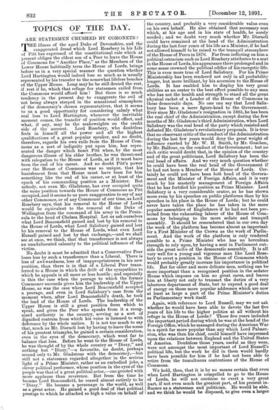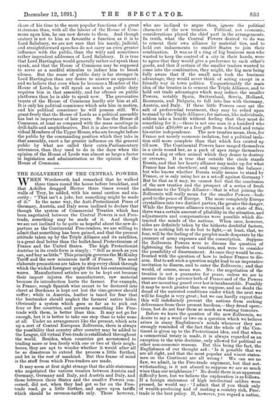TOPICS OF THE DAY.
ARE STATESMEN CRUSHED BY CORONETS? THE illness of the aged Duke of Devonshire, and the exaggerated dread which Lord Rosebery in his Life of Pitt has expressed of the constitutional rule which at present obliges the eldest son of a Peer to leave the House of Commons for "Another Place," as the Members of the Lower House habitually term the House of Lords, brings before us in a very special manner the question whether Lord Hartington would indeed lose so much as is usually represented by his transfer to the somewhat lifeless benches of the Upper House. Long may he be still denied the rest, if rest it be, which that refuge for statesmen exiled from the Commons would afford him ! But there is so much tendency in the present day to exaggerate the evil of not being always steeped in the sensational atmosphere of the democracy's chosen representatives, that it seems to us a good opportunity for considering calmly what real loss to Lord Hartington, whenever the inevitable moment comes, the transfer of position would effect, and what, if any, may be the makeweights on the credit side of the account. Lord Rosebery, who doubtless feels in himself all the power and all the highest qualifications of a great popular speaker, and no doubt, therefore, regards his own exile from the House of Com- mons as a sort of indignity put upon him, has repre- sented the danger which beset Pitt when, by the most dangerous illness of his elder brother, he was threatened with relegation to the House of Lords, as if it must have been the end of his career. And no doubt Pitt's power over the House of Commons was so unique, that his banishment from that House must have been for him something like the end of his career, or at least of the epoch of his commanding position as a Minister. But nobody, not even Mr. Gladstone, has ever occupied quite the same position towards the House of Commons as Pitt occupied, and it seems to us pure exaggeration to say of any other Commoner, or of any Commoner of our time, as Lord Rosebery says, that his removal to the House of Lords would be equivalent to the removal of the Duke of Wellington from the command of his army in the Penin- sula to the head of Chelsea Hospital. Let us ask ourselves what Lord Beaconsfield gained and lost by his removal to the House of Lords, what Lord Salisbury gained and lost by his removal to the House of Lords, what even Lord Russell gained and lost by that exchange,—and we shall see at once, we think, that that transference is not always an unadulterated calamity to the political influence of the victim.
No doubt it must be admitted that a Conservative Peer loses less by such a transference than a Liberal. There is less of awkwardness, less of inappropriateness in his new position, than there is in that of a Liberal Peer trans- ferred to a House in which the drift of the sympathies to which he appeals is all more or less hostile ; and especially is this the case when the peerage to which the former Commoner succeeds gives him the leadership of the Upper House, as was the case when Lord Beaconsfield accepted a peerage, and even in Lord Salisbury's case from the moment when, after Lord Beaconsfield's death, he took the lead of the House of Lords. The leadership of the Upper House is still a great position from which to speak, and gives the Peer who speaks from it a recog- nised authority in the country, serving as a sort of dignified rostrum from which his voice is listened to with deference by the whole nation. It is not too much to say that, much as Mr. Disraeli lost by having to leave the scene of his greatest triumphs, he gained a certain consideration, even in the eyes of the democracy, which went far to balance that loss. Before he went to the House of Lords, he was thought of by the whole country as "Dizzy," and nothing but " Dizzy,"—a favourite, no doubt, perhaps second only to Mr. Gladstone with the democracy,—but still not a statesman regarded altogether in the serious light of a Prime Minister, rather as an embodied joke, a clever political performer, whose position in the eyes of the people was that of a great political actor,—one greeted with more applause than reverence. But from the time he became Lord Beaconsfield, he ceased almost entirely to be "Dizzy." He became a personage in the world, as well as a great actor. He gained a good deal of that political prestige to which he attached so high a value on behalf of the country, and probably a very considerable value even on his own behalf. He also obtained that necessary rest which, at his age and in his state of health, he sorely needed ; and we doubt very much whether Mr. Disraeli could have remained at the head of the Administration during the last four years of his life as a Minister, if he had! not allowed himself to be raised to the tranquil atmosphere of the House of Peers in 1876. Far from inflicting on him a. political ostracism such as Lord Rosebery attributes to a seat in the House of Lords, his appearance there prolonged and in some sense crowned the political edifice of his energetic life. This is even more true of Lord Salisbury. For his Prime Ministership has been rendered not only in all probability longer, but more brilliant, by his accession to the House of Lords. It has enabled him to display his very great abilities as an orator to the best effect possible to any man who has not the health and strength to stand all the great physical racket of a Leader of the House of Commons in these democratic days. No one can say that Lord Salis- bury has been a mere figure-head to the Government. Ever since Mr. Gladstone's resignation in 1885, he has been the real chief of the Administration, except during the few months of Mr. Gladstone's third Administration, when Lord Salisbury was the real head of the party which resisted and defeated Mr. Gladstone's revolutionary proposals. It is true that no observant critic of the conduct of the Administration during the last few years would deny the great weight of influence exerted by Mr. W. H. Smith, by Mr. Goschen, by Mr. Balfour, on the conduct of the Government ; but no such critic would doubt that, in the opinion of the country and of the great politicians, Lord Salisbury has been the real head of affairs. And we very much question whether he could have been the real head of the Government if he had not been a Member of the House of Lords. Cer- tainly he could not have been both head of the Govern- ment and the Minister of Foreign Affairs, and it is very much by his masterly management of Foreign Affairs that he has fortified his position as Prime Minister. Lord Salisbury is a very considerable orator, as he has shown more even by his speeches on public platforms than by his speeches in his place in the House of Lords ; but he could never have taken the place he has taken in the more popular assemblies of Englishmen if he had not been pro- tected from the exhausting labour of the House of Com- mons by belonging to the more sedate and tranquil assembly. It should be remembered that in our own day the work of the platform has become almost as important for a First Minister of the Crown as the work of Parlia- ment. And the work of the platform is only rendered possible to a Prime Minister who has no herculean strength to rely upon, by having a seat in Parliament out- side the great ingl4e of the democratic assembly. It is all very well for a young and vigorous man like Lord Rose- bery to covet a position in the House of Commons which would probably greatly increase his importance in political life. But for older and more delicate men, nothing can be more important than a recognised position in the sedater House which imposes on him no great cares, and leaves him at liberty not only to transact the duties of a very laborious department of State, but to expend a good deal of energy on those more popular addresses which are now at least as large a part of the Prime Minister's duties as Parliamentary work itself.
Again, with reference to Lord Russell, may we not ask whether he would have been able to devote the last five years of his life to the higher politics at all without his refuge in the House of Lords ? Those five years included, the important period during which he was at the head of the Foreign Office, which he managed during the American War in a spirit far more popular than any which Lord Palmer- ston, who was then his chief, could himself have impressed. upon the relations between England and the United States of America. Doubtless those years, useful as they were were not amongst the most important of Lord Russell's political life, but the work he did in them would hardly have been possible for him if he had not been able to retire from the tumultuous contentions of the House of Commons.
We hold, then, that it is by no means certain that even when Lord Hartington is compelled to go to the House of Lords, he will not continue to exert a very great part, if not even much the greatest part, of his present in- fluence as a statesman and politician. He would be able, and we think he would be disposed, to give even a larger share of his time to the more popular functions of a great statesman than, with all the labour of the House of Com- mons upon him, he can now devote to them. And though oratory is not to him so favourite a function as it is to Lord Salisbury, we are not sure that his manly, judicial, and straightforward speeches do not carry an even greater influence with the public, than the witty and sometimes rather imprudent addresses of Lord Salisbury. It is true that Lord Hartington would generally rather not speak than speak, and that the House of Commons may be supposed to serve as a needful stimulus to induce him to break silence. But the sense of public duty is far stronger in Lord Hartington than any desire to answer an opponent ; and we believe that even when he becomes a Member of the House of Lords, he will speak as much as public duty requires him in that assembly, and far oftener on public platforms than he is able to speak now. The provocative taunts of the House of Commons hardly stir him at all. It is only his political conscience which sets him in motion, and his political conscience he will possess still. We grant freely that the House of Lords as a political assembly has lost in importance of late years. So has the House of Commons, at least as compared with the mass meetings in drill-halls and amphitheatres. But it is also true that indi- vidual Members of the Upper House, who are brought before the public by the commanding position which they take in that assembly, exert a far greater influence on the general public by what are called their extra-Parliamentary utterances, than they used to do in the days when the opinion of the House of Lords was almost as large a factor in legislation and. administration as the opinion of the House of Commons.











































 Previous page
Previous page